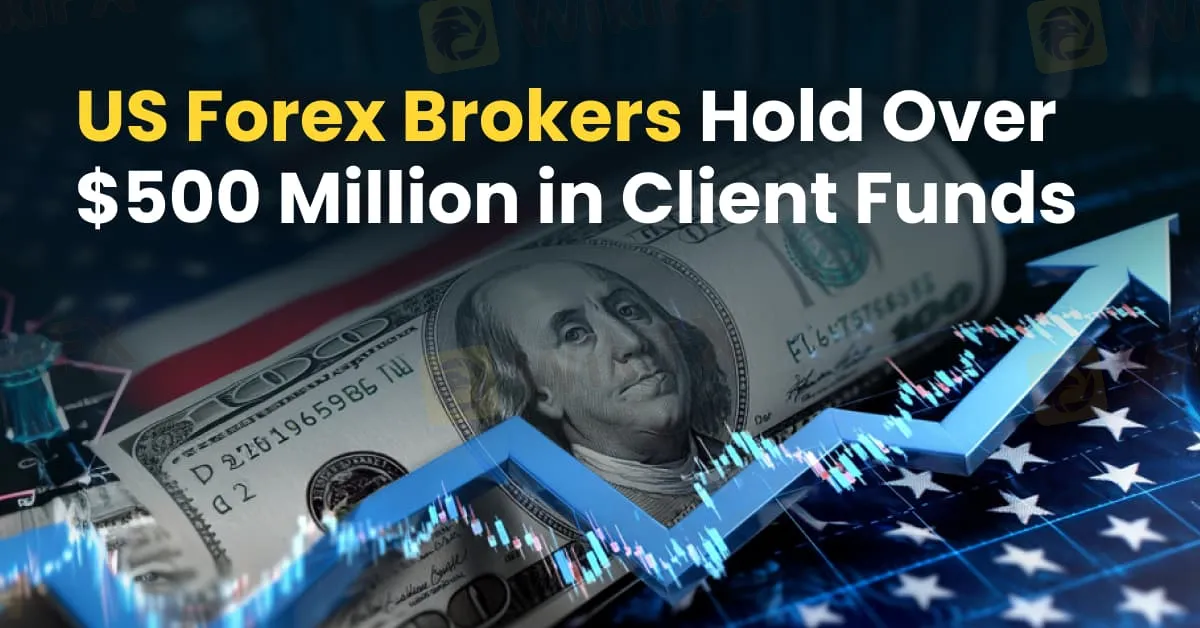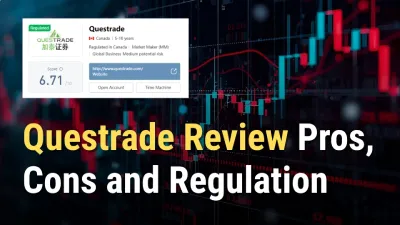简体中文
繁體中文
English
Pусский
日本語
ภาษาไทย
Tiếng Việt
Bahasa Indonesia
Español
हिन्दी
Filippiiniläinen
Français
Deutsch
Português
Türkçe
한국어
العربية
US Forex Brokers Hold Over $500 Million in Client Funds
Abstract:According to report, U.S. retail forex brokers collectively held approximately $527 million in client funds as of February 2025—a figure representing a 2.9% increase from January’s total of around $512 million, according to the latest regulatory data released by the Commodity Futures Trading Commission (CFTC).

According to report, U.S. retail forex brokers collectively held approximately $527 million in client funds as of February 2025—a figure representing a 2.9% increase from Januarys total of around $512 million, according to the latest regulatory data released by the Commodity Futures Trading Commission (CFTC). Despite the monthly growth, the current level marks a 2.9% year-over-year decline when compared with February 2024, highlighting both recent momentum and long-term market challenges.
Market Dynamics and Concentration
The U.S. retail forex market remains notably concentrated. The top three brokers—Gain Capital, Oanda, and Charles Schwab—hold a commanding share, collectively managing over 85% of client funds. This concentration is largely attributable to substantial regulatory barriers. For example, the industrys stringent requirements, including a minimum capital threshold of $20 million for forex dealers, have solidified the position of established players, effectively limiting the entry of new competitors.
Gain Capital Takes the Lead
Among the leading players, Gain Capital has maintained its strong market position with an impressive 42.7% share of the total client funds. As of February 2025, Gain Capital held about $225 million in client deposits. This figure not only represents a 6% month-over-month increase from January but also reflects a 7% year-over-year growth compared to February 2024. The consistent upward momentum at Gain Capital underscores its resilience and the trust it commands among U.S. forex traders.
Regulatory Landscape
According to the CFTC filing, all six registered retail foreign exchange dealers (RFEDs) operating in the U.S.—namely Gain Capital, Oanda, Charles Schwab, IG US, Interactive Brokers, and Trading.com—continue to exceed the regulatory minimum capital requirements. These capital buffers are designed to safeguard client funds and maintain market stability, ensuring that financial risks remain contained in an inherently volatile trading environment.
The monthly compilation of financial reports from futures commission merchants (FCMs) and RFEDs serves as a key indicator of market health and regulatory compliance in the forex sector. The sustained collection of these reports aids in monitoring market practices and enhancing investor protection measures across the industry.
Conclusion
While the slight increase in client funds from January to February 2025 is a positive signal of short-term market strength, the overall decline compared to February 2024 suggests that U.S. retail forex brokers continue to face long-term pressures. The combined impact of stringent regulatory requirements and market concentration presents a double-edged sword, fostering both stability and competitive challenges. Nonetheless, with market leaders like Gain Capital demonstrating robust performance, the outlook for U.S. forex brokers remains cautiously optimistic as they strive to balance regulatory compliance with the demands of an evolving market landscape.

Disclaimer:
The views in this article only represent the author's personal views, and do not constitute investment advice on this platform. This platform does not guarantee the accuracy, completeness and timeliness of the information in the article, and will not be liable for any loss caused by the use of or reliance on the information in the article.
Read more

Seaprimecapitals Withdrawal Problems: A Complete Guide to Risks and User Experiences
Worries about Seaprimecapitals withdrawal problems and possible Seaprimecapitals withdrawal delay are important for any trader. Being able to get your money quickly and reliably is the foundation of trust between a trader and their broker. When questions come up about this basic process, it's important to look into what's causing them. This guide will tackle these concerns head-on, giving you a clear, fact-based look at Seaprimecapitals' withdrawal processes, user experiences, and trading conditions. Most importantly, we'll connect these real-world issues to the single most important factor behind them: whether the broker is properly regulated. Understanding this connection is key to figuring out the real risk to your capital and making a smart decision.

iFX Brokers Review: Do Traders Face Withdrawal Issues, Deposit Credit Failures & Free Coupon Mess?
Have you had to pay several fees at iFX Brokers? Had your trading profit been transferred to a scamming website, causing you losses? Failed to receive withdrawals from your iFX Brokers trading account? Has your deposit failed to reflect in your trading account? Got deceived in the name of a free coupon? Did the broker officials not help you in resolving your queries? Your problems resonate with many of your fellow traders at iFX Brokers. In this iFX Brokers review article, we have explained these problems and attached traders’ screenshots. Read on!

NinjaTrader Exposed: Why Traders are Calling Out NinjaTrader’s Lifetime Plan & Chart Data
Did NinjaTrader onboard you in the name of the Lifetime Plan, but its ordinary customer service left you in a poor trading state? Do you witness price chart-related discrepancies on the NinjaTrader app? Did you have to go through numerous identity and address proof checks for account approval? These problems occupy much of the NinjaTrader review online. In this article, we have discussed these through complaint screenshots. Take a look!

Questrade Review Pros, Cons and Regulation
Is Questrade legit? Yes—CIRO regulated broker offering stocks, ETFs, forex, CFDs, bonds, and more with low fees and modern platforms.
WikiFX Broker
Latest News
Close Up With WikiFX —— Take A Close Look At Amillex
GGCC Bonus and Promotions: A Data-Driven Analysis for Experienced Traders
AccentForex Review: Is It Safe to Invest or Scam?
Questrade Review Pros, Cons and Regulation
CapEx Spending On AI Is Masking Economic Weakness
Is Your Money Safe? The Capital.com Withdrawal Mystery Revealed
World Forex Review: Does the Broker Deny Withdrawals and Scam Traders via Fake Bonuses?
Revolut Expands in South Africa with Banking Licence Move
The Broker Dilemma: Why Your Choice Could Make or Break Your Forex Journey
【WikiEXPO Global Expert Interviews】Sheikh Muhammad Noman: The Future of Investment in the GCC
Currency Calculator



